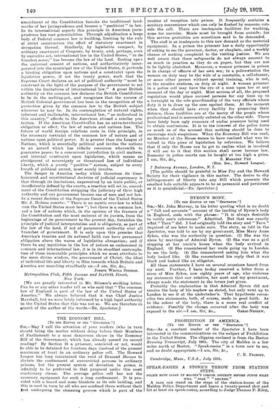THE ECONOMY BILL.
ITO THE EDITOR OF THE " SPECTATOR."]
Sia,—May I call the attention of your readers (who in turn should bring the matter without delay before their Members of Parliament) to a most dangerous clause in the Economy Bill of the Government, which has already passed its second reading? By Section 18 a prisoner, convicted or not, would be able to be detained for fourteen days (instead of the present maximum of four) in an ordinary police cell. The Howard League has long maintained the need of Remand Houses to obviate the confinement of unconvicted persons in ordinary prisons, but the present system of detention in prison is infinitely to be preferred to that proposed under this most reactionary clause. The average police cell has not the necessary equipment for such a long confinement. It is pro- vided with a board and some blankets as its sole bedding, and this is used in turn by all who are confined there without their ,Irst undergoing the cleansing process which is part of the
routine of reception into prison. It frequently contains a sanitary convenience which can only be flushed by someone out- side -the cell. There are inadequate facilities for washing, none for exercise. Meals must be brought from outside; for this service gratuities are sometimes said to be demanded.
The stag is as inadequate to this new demand as the material equipment. In a prison the prisoner has a daily opportunity of asking to see the governor, doctor, or chaplain, and a weekly chance of making complaint to the visiting justice. We are well aware that these safeguards do not always amount to as much in practice as they do on paper, but they are not to be lightly abolished. Moreover, a woman prisoner in prison is in charge of officers of her own sex; in a police-station the woman on duty may be the wife of a constable, a cell-cleaner, or some other person without special training, who is not, in the smaller stations, on duty at night. A woman prisoner in a police cell may have the eye of a man upon her at any moment of the day or night. Most serious of all, the proposed regulation would. place accused persons for any time up to a fortnight in the sole guardianship of the very officials whose duty it is to draw up the case against them. At the moment when they should have every facility for preparing their defence, those facilities are at the mercy of the people whose professional zeal is necessarily enlisted on the other -side. There have lately been ugly rumours of undue pressure being used to obtain confessions. It is to the interest of the police force as much as of the accused that nothing should be done to encourage such suspicions. When the Economy Bill was read, no Member of the House seems to have realized what was in- volved in this piece of legislation by reference. We believe that if only the House can be got to realize what is involved it will see to it that this section shall never become law. Economy in police courts can be bought at too high a price.
(Hon. Sec., Howard League).
7 Dalmeny Avenue, London, N.7.
[The public should be grateful to Miss Fry and the Howard Society for their vigilance in this matter. The desire to slip infringements of liberty into any Bill which presents the smallest hole suitable appears to be as perennial and persistent as it is prejudicial.--En. Spectator.]


































 Previous page
Previous page